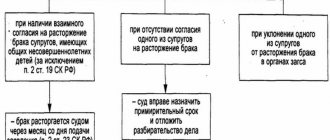The following two tabs change content below.
- Author
- Author's articles
Angelika Senkina (Lawyer)
6 years of experience.
Author: Angelika Senkina (Lawyer) (All articles by the author)
- Collection of alimony for the past period - 04/16/2020
- In what cases is the employer obliged to compensate the employee for the earnings he did not receive? — 04/06/2020
- Alimony for a pregnant wife in marriage - 03/18/2020
Many Russian citizens are interested in the question of how to get a divorce if the marriage took place in another country. As a general rule, if family relationships were officially established on the territory of a foreign state, this union is considered legal in Russia. The main thing is to confirm its legality.
Legal basis
The procedure for concluding and dissolving marriages is regulated by the Family Code of the Russian Federation. According to Article 158, a union registered on the territory of another state is recognized as legal in Russia if:
- the requirements of the legislation of the foreign state are met;
- there are no factors that could prevent marriage.
Article 160 of the RF IC states that the annulment of a marriage legalized in Russia is carried out in accordance with the legislation of the Russian Federation.
Possibility of dissolving a union on the territory of another state
Divorce of Russian citizens abroad is also possible by applying to local judicial authorities. If the laws of the state in whose territory the divorcees live are consistent with Russian legislation, such a divorce abroad will be recognized in the homeland. However, citizens who are faced with the question of how to file for divorce abroad note that divorce proceedings abroad are significantly more expensive and take a much longer period of time.
For example, in a number of US states, the divorce process can take up to several years. In some European countries, before registering the fact of divorce, the court will compulsorily oblige the married couple to undergo a special course with a specialist, and only if the family psychologist does not help to return the old feelings, the divorce will be carried out.
In Western European countries, the amount of state duty and other fees required to file a claim for divorce is so high that even fairly wealthy citizens cannot afford a trial. The German court has every right to refuse citizens a divorce if it considers the arguments of the husband and wife unconvincing. And the fact that both participants in the union insist on its termination is not particularly significant. As a result, citizens will receive a divorce, but it will take a lot of time.
And these are not all the nuances of divorce abroad. Therefore, after weighing the pros and cons, most Russians prefer to conduct divorce proceedings in a domestic court.
Legalization
Before a divorce, you must go through the procedure of legalizing a document confirming the marriage. Legalization is carried out in one of two ways:
- in a simplified manner;
- through the consulate.
A simplified procedure is provided for documents issued by one of the countries party to the 1961 Hague Convention. A special “apostille” stamp is placed on the documentation of marriage. The mark is made by the authority registering the marriage abroad. After this, the document is translated into Russian, and the translation itself is certified by a notary.
Legalization through the consulate takes place if the marriage was concluded in a country that is not a party to the Hague Convention. In this case, the spouses should contact the Russian consulate located on the territory of a foreign state.
Specialists will check the documents for compliance with the requirements of the laws of the Russian Federation. If inconsistencies are identified, the married couple will be denied legalization. In this case, their marriage will be declared invalid in Russia. If all conditions are met, the consulate will issue a legalized document.
Divorce when the husband or wife lives abroad
Everyone is familiar with stories when a married girl, who went abroad to work or continue her education, suddenly falls in love with a foreigner and wants to get a divorce from her husband.
You can do this in several ways:
- The young lady comes to her native state and submits an application to terminate the marriage. But most often, girls are afraid to leave their new chosen one for a long time, because if the husband refuses, then the divorce process can be long.
- Invite the husband, who remains in Russia, to initiate the process and send him the notarized consent. Not every man will agree to such a proposal, but if he himself is not averse to breaking up, then such an outcome will suit everyone.
- Entrust the case to an experienced lawyer who will represent her interests in court. To do this, you need to find an experienced family law lawyer, get a preliminary consultation and enter into an agreement to represent interests during the divorce process.
When a married couple, during a court hearing, in addition to the issue of divorce, is going to decide a lot of nuances, for example, about the maintenance of children, the assignment of alimony payments, the division of joint property, and so on, then the case will be heard in the district court and may drag on for several months.
Where to contact
An application for divorce in another state is sent to the registry office or court. In order for spouses to be divorced through the registry office, they need:
- apply;
- pay the state fee;
- in a month, receive a document confirming the divorce.
The application is submitted by the spouses jointly. Unilateral application is allowed if the foreign spouse:
- declared missing;
- incapacitated;
- sentenced to a term of over 3 years.
The unified application form was approved by Decree of the Government of the Russian Federation of October 31, 1998 No. 1274. The form is issued at the registry office. It contains the following information:
- personal data of spouses;
- details of the passport and union registration document;
- surnames that are assigned to everyone after the annulment of marriage ties.
At the end there is a date and the handwritten signature of each spouse.
The following must be attached to the application:
- passports of spouses;
- document confirming marriage;
- receipt of payment of state duty.
The married couple is given a month to think about it, during which they can change their decision. If they still wish to dissolve their union, then on the appointed date they must appear at the registry office and confirm their intention. After which, everyone will be given a copy of the certificate of dissolution of marriage, and their union will be annulled.
When divorced through court
According to clause 8, part 3, art. 402 of the Code of Civil Procedure of the Russian Federation, the judicial authorities of Russia are empowered to make decisions on the divorce of foreign nationals if they have a place of residence in the Russian Federation, as well as if the husband or wife is a citizen of Russia.
In some circumstances, a marriage can only be dissolved by a court decision. Writing a statement of claim will be required if:
- one of the couple does not agree to divorce;
- a married couple has children under 18 years of age;
- there are disputes regarding joint property.
The following is attached to the claim:
- passport;
- marriage document;
- children's birth certificate;
- documentation for joint property.
All documents received in a foreign country must be translated into Russian, and the translation must be notarized.
Other documents may be submitted to the court to facilitate the decision to dissolve the union. It is also permissible to invite witnesses to give evidence related to the divorce proceedings.
Annulment of marriage bonds in court takes longer than through the registry office. The court has the right to grant the spouses a period of up to 3 months for reconciliation.
How to get a divorce if the marriage is registered in another country?
When entering into an alliance with a foreigner outside the state, many questions may arise. When it comes to divorce, there are even more of them. The most important of them is the possibility of carrying out divorce proceedings in Russia if it was concluded abroad. It is possible to implement such a procedure, but this will require compliance with some rules.
The basic requirements of the legislation are set out in Article 160 of the RF IC and say that, regardless of the place where the union was concluded, its dissolution on the territory of the Russian Federation is carried out precisely according to the rules of the legislation of the Russian Federation. In this case, you will have to contact either the registry office or the court, depending on the presence of joint children and property.
Where to file for divorce in another state?
When a divorce is carried out in a standard manner, interested parties have two options:
- to the registry office;
- to court.
However, when it comes to divorce abroad, the question arises of where to file the application. It all depends on where each spouse is located.
If at least one of them lives on the territory of the Russian Federation or has the opportunity to go there to carry out the divorce procedure, then you can apply to the same registry office or court.
If neither spouse can come to the Russian Federation, then it is necessary to contact the diplomatic missions or consulate of Russia in the territory of the state where they are located.
This rule only works if divorce in the Russian Federation is possible through the registry office.
In all other situations, when the dissolution of the union must be carried out in court, you will have to go to a Russian court.
Interested parties also have the right to contact the competent authorities of the state where they are located. The problem is that in this case the marriage will be dissolved according to the rules of another country. This is not always applicable, since the legislation of some countries is much more strict regarding divorce than the Russian one. That is why in some cases it is easier to come to the Russian Federation and implement the procedure here.
What documents are required for divorce?
If the process is carried out in the Russian Federation, you will need:
- application from one of the spouses;
- passports of the parties;
- marriage registration certificate. If it is issued according to the rules of another country, then an apostille and notarized translation of documents are required;
- receipt for payment of state duty, etc.
If the process is carried out outside the Russian Federation, then the list of required documents must be clarified depending on the rules of the state where the marriage is dissolved.
From the point of view of ease of registration, it is advisable to get a divorce exactly where the union was concluded. This will save you from numerous confirmations of documents, translation into the national language and other nuances.
Deadlines and legal consequences
Regardless of the country in which the union is registered, when it is dissolved in the Russian Federation, the rules of the RF IC and other legal acts apply. This suggests that even in the most difficult case, the judge can grant a maximum of 3 months to think about it. He has the right to postpone the meeting, but this period is also not too long.
Expert opinion
Irina Vasilyeva
Civil law expert
According to the laws of many foreign countries, divorce proceedings can last for years.
If there are no children together, the procedure is carried out faster and can take up to a month.
The legal consequences of such a procedure will appear immediately after its implementation and receipt of a divorce certificate.
Dissolution of marriage in the registry office
The easiest, fastest and least troublesome way to get a divorce is to go to the registry office. Possible if the spouses express mutual consent, have no complaints regarding the division of property and claims regarding the upbringing and maintenance of children. You will need to collect a package of documents:
- Claim.
- Marriage certificate.
- Consent of the second spouse (with a notary stamp), if he cannot visit the registry office at the time of filing the application.
- Spouses' passports.
- Confirmation of payment of the duty (650 rubles).
The law also spells out situations when the consent of the other party to terminate the relationship is not required:
- Incapacity of the spouse (a corresponding certificate is required, for example, from a psychiatric or drug treatment institution).
- Lack of information about the whereabouts of the spouse (you need to get a certificate from the Ministry of Internal Affairs).
- The spouse has been sentenced to more than three years and is in prison (a supporting certificate is required).
The application must be submitted at the place of permanent or temporary residence. He is registered. A divorce certificate is issued a month from the date of application.
If you apply to the registry office after the trial, you will need a court extract. When the former spouses receive the certificate, the marriage is considered dissolved within Russia. The foreigner is required to confirm this in his/her country.
Applicable right
Divorce relations complicated by a foreign element are regulated by the norms of Section 7 of the Family Code of the Russian Federation. However, since the Family Code of the Russian Federation regulates only some issues of private international law (establishing the content of foreign family law, a clause on public policy in the application of foreign family law). One must think that the general provisions of Section 6, Part 3 of the Civil Code of the Russian Federation will be applied by analogy to issues not regulated by family law. As N.I. rightly notes. Maryshev, this gap in legal regulation is resolved by applying the general provisions of private international law provided for in Section 6 of Part Three of the Civil Code.
According to Art. 1186 of the Civil Code of the Russian Federation “Rules for determining the law applicable to civil relations complicated by a foreign element”, the applicable law is established on the basis of the Civil Code of the Russian Federation, other laws, international treaties of the Russian Federation, as well as customs recognized in the Russian Federation. Among the international treaties of the Russian Federation that are subject to application to cases of divorce with a foreign person, one can name the CIS Minsk Convention on legal assistance and legal relations in civil, family and criminal matters of 1993, as well as numerous bilateral agreements of the Russian Federation on legal assistance.
The law to be applied to the termination of a contract with a foreigner is determined in accordance with Art. 160 of the Family Code of the Russian Federation. Analysis of this article allows us to conclude that the basis for determining the applicable law is the territorial principle of the place of divorce. Thus, divorce on the territory of the Russian Federation is subject to the requirements of Russian legislation, while divorce abroad will be regulated by the relevant rules of foreign legislation. Russia, as a party to the Minsk Convention, is subject to the rules set out in this Convention. Thus, the Convention prescribes the application of the legislation of the country of which the spouses are citizens at the time of filing the application; in the case where the country of citizenship of the spouses does not coincide, the legislation of the state whose institution is considering the case of dissolution (lex fori) applies. In 2002, the CIS member states adopted an almost identical Chisinau Convention on legal assistance and legal relations in civil, family and criminal matters, which, however, does not repeal the previously adopted Minsk Convention. It continues to apply to Russia, which has not ratified the Chisinau Convention.
If, in accordance with the applicable conflict of laws rule, Russian law is to be applied, it is not entirely clear whether a court hearing a case of divorce with a foreign person can resolve the following important issues in accordance with Russian law: 1) with which parent the minor children will live; 2) from which parent and in what amount alimony is collected; 3) divides the common property of the spouses; 4) determines the procedure for paying funds for the maintenance of a disabled spouse. The logic of the legislator is that a separate conflict of laws rule (Article 163 of the RF IC) for determining the law applicable to the rights and responsibilities of parents and children, including the responsibilities of parents to support children, is designed to take into account the interests of the child as much as possible. Therefore, the application of Russian law, when parents and their children live together in another state, in this case comes into conflict with the requirements of Art. 163 RF IC.
Procedural issues
If a case is considered in a Russian court, the judge, along with procedural rules, applies rules that reflect the specifics of cases with a foreign element. Thus, one should take into account the principle of the invariability of the place of consideration after the case is accepted for proceedings, as well as the consequences of considering the case between the same parties, on the same subject and on the same grounds simultaneously in another state. According to Art. 406 of the Code of Civil Procedure of the Russian Federation provides for various procedural consequences for the parties depending on the stage at which the case is in a court of a foreign state. In particular, if a foreign court makes a decision in a case, the judge refuses to accept the statement of claim or terminates the proceedings, subject to the existence of an international treaty on mutual recognition and enforcement concluded with Russia; if the case is pending in a foreign court, the judge returns or leaves the statement of claim without consideration. The problem of parallel litigation in a foreign country is resolved in some bilateral agreements on legal assistance, which determine how the court should proceed with the claim if a case is already pending in a court of another country regarding a dispute between the same parties, about the same subject and on the same issues. the same grounds (for example, about the divorce of spouses living in different countries and filing lawsuits in the courts of their countries).
Divorce of a Russian citizen from a foreigner in another country
Knowing how to file a divorce abroad, you can save yourself from the need to go to Russia. In order for a marriage to be declared invalid in Russia, the registry office must be provided with a decision from the competent authorities. These include the consulate or court of a foreign state.
Each country has its own conditions for divorce proceedings:
- In America, any divorce is formalized through the court, even with mutual consent.
- In the Netherlands, divorce is possible no earlier than one year after marriage.
- In Italy, a marriage is only declared invalid for valid reasons. The procedure can take months.
- In Islamic countries, it is more difficult for a woman to get a divorce than for a man. For a husband, any little thing can be a reason. The law will be on his side. A woman will have to prove in court the fact of violence, infidelity or financial insolvency of her husband.
- In Israel, divorce cases are heard by the rabbinate court and the council of elders. First, the elders try to reconcile the spouses, and then the court gets involved. Divorce is possible only with the mutual consent of the spouses. If a woman is categorically against the breakup of the family, the man has the right to marry a second woman.
- In France, an application by one of the parties is sufficient for a divorce. If there are minor children, the divorce process may be delayed.
How to get a divorce in the Russian Federation without the presence of your husband
Termination of a marriage without the participation and presence of a foreigner is possible through a court or a registry office. The choice of the appropriate authority will depend on the situation.
The registry office divorces unilaterally if the foreigner has given official written consent and confirmed its legality by a notary. It is important that there are no disagreements regarding children and property. In such circumstances, the terms and process of divorce are the same as in the case of the presence of the defendant.
If the divorce cannot be obtained at the registry office, then the case is sent to court. In order for the claim to be accepted for consideration, it is necessary to send the application to the residence address of the other party. If the defendant left Russia, then the document should be sent to the address of his last place of residence or to the location of his property.
It is also required to indicate that it is not possible to notify the defendant at his current place of residence or his whereabouts are unknown to the plaintiff.
Before starting the process of dissolution of the union, the court needs to know that the alien has received notice of the proceedings. If the defendant is not in court, all his rights must be taken into account.
It is much easier to file a divorce if the defendant has filed a formal request to conduct the case without his participation. Or there is a power of attorney issued to a representative who will defend the interests of the defendant in a Russian court.
Important! Confirmation of the termination of the marriage must be carried out in Russia and in the home state of the spouse. Otherwise, such a divorce is not fully valid, since the marriage record has not been removed from all registers.
Divorcing a foreign husband is not an easy matter, so it is better to come to a common agreement on all important issues.
Possible difficulties
Difficulties often arise when a couple who has children together divorces. In our country, they almost always stay with their mother. But the laws are not like this everywhere.
For example, if a marriage is concluded with a citizen from Europe, the United States of America or a Muslim country, then there is a high probability that the court will be on the side of the father. Representatives of these states almost always strive to take children home. The basis for this is the laws of the countries in whose territory the marriage took place. The state that issued the child’s birth certificate is also taken into account.
So, if the spouse is Muslim, then Sharia law suggests that children should live with their father. And it will be almost impossible to argue with this. Difficulties will also arise when the children are citizens of the country where the marriage took place.
Information!
If you are faced with such a situation, then you will have to return to Russia to resolve divorce issues.
Divorce proceedings with a foreigner are almost always carried out according to the laws in force on the territory of the Russian Federation. Difficulties arise when the second spouse does not live in our country or refuses to return even while the case is being considered.









